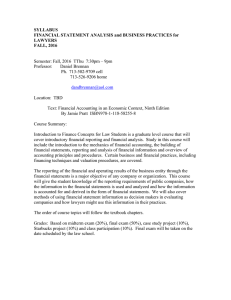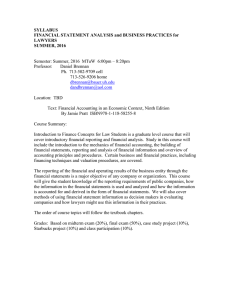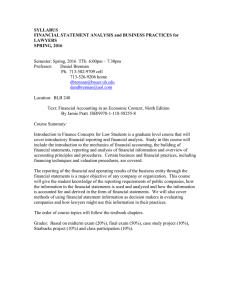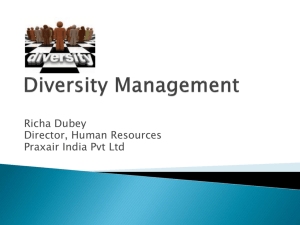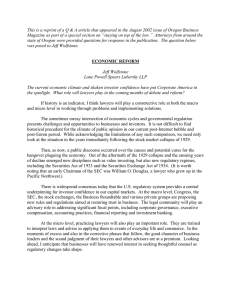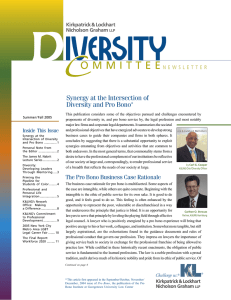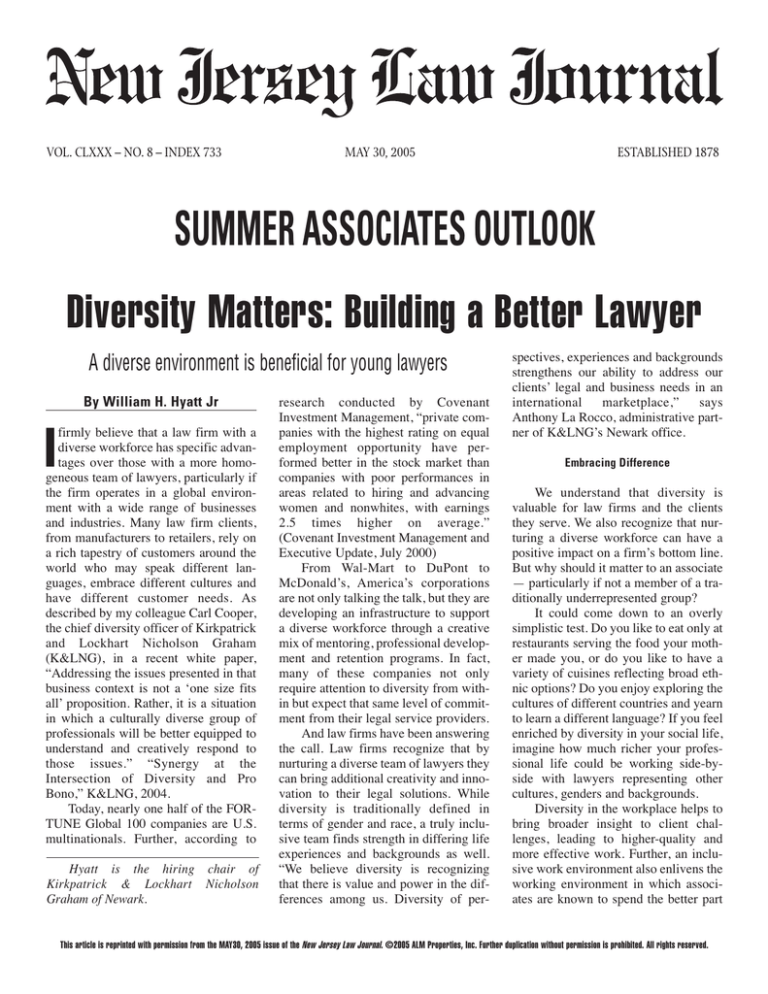
VOL. CLXXX – NO. 8 – INDEX 733
MAY 30, 2005
ESTABLISHED 1878
SUMMER ASSOCIATES OUTLOOK
Diversity Matters: Building a Better Lawyer
A diverse environment is beneficial for young lawyers
By William H. Hyatt Jr
firmly believe that a law firm with a
diverse workforce has specific advantages over those with a more homogeneous team of lawyers, particularly if
the firm operates in a global environment with a wide range of businesses
and industries. Many law firm clients,
from manufacturers to retailers, rely on
a rich tapestry of customers around the
world who may speak different languages, embrace different cultures and
have different customer needs. As
described by my colleague Carl Cooper,
the chief diversity officer of Kirkpatrick
and Lockhart Nicholson Graham
(K&LNG), in a recent white paper,
“Addressing the issues presented in that
business context is not a ‘one size fits
all’ proposition. Rather, it is a situation
in which a culturally diverse group of
professionals will be better equipped to
understand and creatively respond to
those issues.” “Synergy at the
Intersection of Diversity and Pro
Bono,” K&LNG, 2004.
Today, nearly one half of the FORTUNE Global 100 companies are U.S.
multinationals. Further, according to
I
Hyatt is the hiring chair of
Kirkpatrick & Lockhart Nicholson
Graham of Newark.
research conducted by Covenant
Investment Management, “private companies with the highest rating on equal
employment opportunity have performed better in the stock market than
companies with poor performances in
areas related to hiring and advancing
women and nonwhites, with earnings
2.5 times higher on average.”
(Covenant Investment Management and
Executive Update, July 2000)
From Wal-Mart to DuPont to
McDonald’s, America’s corporations
are not only talking the talk, but they are
developing an infrastructure to support
a diverse workforce through a creative
mix of mentoring, professional development and retention programs. In fact,
many of these companies not only
require attention to diversity from within but expect that same level of commitment from their legal service providers.
And law firms have been answering
the call. Law firms recognize that by
nurturing a diverse team of lawyers they
can bring additional creativity and innovation to their legal solutions. While
diversity is traditionally defined in
terms of gender and race, a truly inclusive team finds strength in differing life
experiences and backgrounds as well.
“We believe diversity is recognizing
that there is value and power in the differences among us. Diversity of per-
spectives, experiences and backgrounds
strengthens our ability to address our
clients’ legal and business needs in an
international
marketplace,”
says
Anthony La Rocco, administrative partner of K&LNG’s Newark office.
Embracing Difference
We understand that diversity is
valuable for law firms and the clients
they serve. We also recognize that nurturing a diverse workforce can have a
positive impact on a firm’s bottom line.
But why should it matter to an associate
— particularly if not a member of a traditionally underrepresented group?
It could come down to an overly
simplistic test. Do you like to eat only at
restaurants serving the food your mother made you, or do you like to have a
variety of cuisines reflecting broad ethnic options? Do you enjoy exploring the
cultures of different countries and yearn
to learn a different language? If you feel
enriched by diversity in your social life,
imagine how much richer your professional life could be working side-byside with lawyers representing other
cultures, genders and backgrounds.
Diversity in the workplace helps to
bring broader insight to client challenges, leading to higher-quality and
more effective work. Further, an inclusive work environment also enlivens the
working environment in which associates are known to spend the better part
This article is reprinted with permission from the MAY30, 2005 issue of the New Jersey Law Journal. ©2005 ALM Properties, Inc. Further duplication without permission is prohibited. All rights reserved.
NEW JERSEY LAW JOURNAL, MAY 30, 2005
2
of their day.
A recent article in Diversity & The
Bar discussed the opportunities firms
have to create an inclusive “fusion” workplace that taps into the uniqueness of each
individual. “Both female and male colleagues intersect across gender, race, and
ethnicity — but also across specialty
areas, social and economic strata, religious and political affiliations, martial status, generation, and physical and mental
abilities. A fusion workplace successfully
merges these differences to spark creative
new alliances to moving the organization
forward and setting it apart from the competition.” (“Creating a ‘Fusion
Workplace,’” Diversity & The Bar,
March/April 2005)
Making Diversity Programs Work
Just as all law firms differ, so too do
their diversity programs. To help nurture
successful programs, the Minority
Corporate Counsel Association (MCCA)
has been at the forefront of this issue, providing guidance and collecting best practices. While there are numerous contributors to a successful diversity program,
below are just a few of the key factors:
Leadership. Partners drive a law
firm’s culture and priorities. A powerful
diversity initiative requires a committed
management, not just at the firm-wide
level, but in each office. The management must also have someone who is
accountable for nurturing and implementing a diversity program. Diversity
must be a core value of the firm and
must consistently factor into the firm’s
overall management.
Further, diverse attorneys must be
empowered to take leadership positions
in their firm, adding their insights into
strategic planning and day-to-day operation of the firm.
Inclusion. The true value of a diverse
workforce becomes apparent when there
is a firm culture and infrastructure that
empowers all attorneys — across the
board — to interact in a meaningful way
not just on legal work, but socially as
well. Diversity doesn’t work in silos; it
requires true teamwork to highlight the
valuable benefits of a diverse workforce.
Measuring success in diversity
should not rely merely on taking head
counts, but rather on making those
heads count.
Mentoring. A support system, predicated on a commitment to mentoring,
is key to the retention of all attorneys,
particularly diverse attorneys. At
K&LNG, it is the chief diversity officer’s responsibility to develop a firmwide mentoring program that includes
gender and race-specific innovations to
enhance retention of diverse attorneys.
K&LNG’s mentoring program
focuses on integrating new lawyers into
our firm culture, uncovering each individual’s strengths, and ensuring that
they have the training they need to be
successful. There is also the added
involvement of a committee in each
office comprised of diverse lawyers
who can help to mentor and guide new
lawyers.
Openness. A diversity program is
only as successful as the level of openness the lawyers bring to it. An environment that encourages dialogue and
rewards individuals for presenting their
unique perspective is crucial. When a
law firm pays lip service to diversity,
diverse attorneys do not feel supported
or meaningfully engaged and it
becomes harder to retain them.
The Last Word
Perhaps the argument for diversity
180 N.J.L.J. 733
is best conveyed in a recent article by
Dr. William Guillory and Daniel
Guillory, of Innovations International, a
global training and development firm:
Even though leadership may be
committed to diversity, each of
us will have to make a similar
individual commitment. This
commitment means that when
our day-to-day way of functioning involves a business, ethical,
or values-based decision regarding diversity, we will take the
action necessary for diversity to
become a reality. It is important
to realize that creating diversity
is crucial to an organization’s
long-term success and, correspondingly, job security — particularly in a competitive business environment. “Becoming a
Diverse Law Firm — Why it is
Important, and the Skills
Necessary to be Effective in an
Increasingly
Diverse
Environment,”
K&LNG
Diversity
Committee
Newsletter, Winter/Spring 2005.
Seeking out a law firm where
diversity is a core value can reward
young lawyers in three ways. First, it
will provide a stimulating work environment where new perspectives and
insights are not only welcomed but
applauded. Second, working beside
people different from you will create
opportunities to approach legal challenges from a fresh perspective.
Lastly, a culturally diverse workplace
will provide the satisfaction of knowing that the level of service you are
providing your clients reflects the
diverse landscape in which the client
operates. ■

